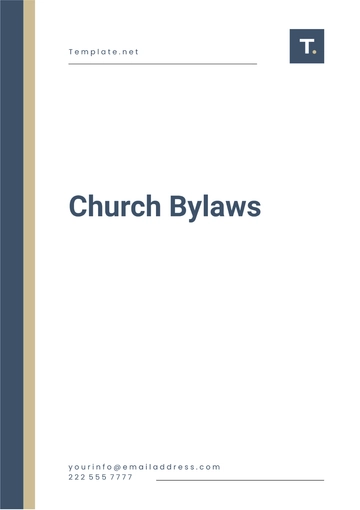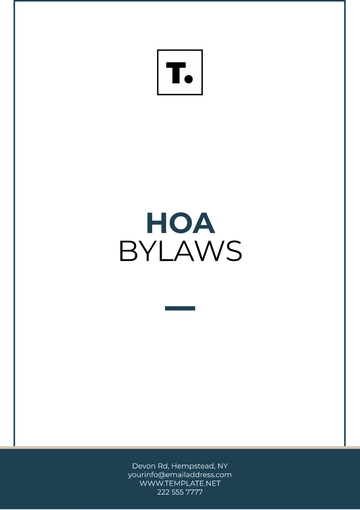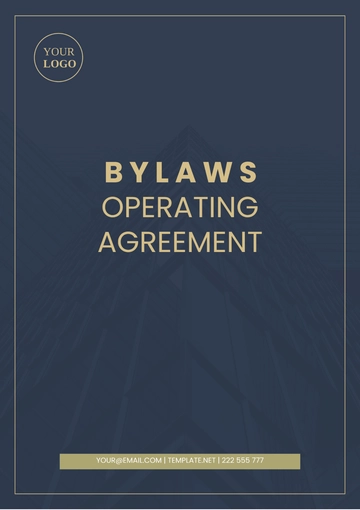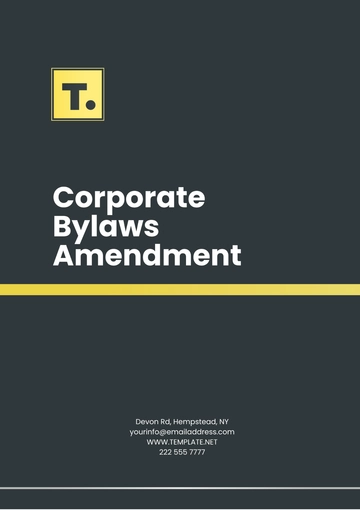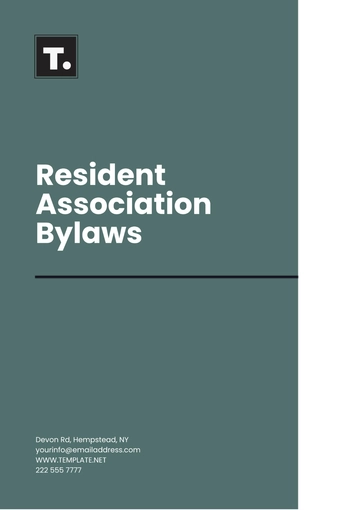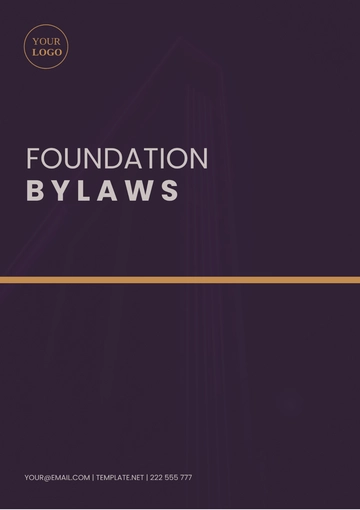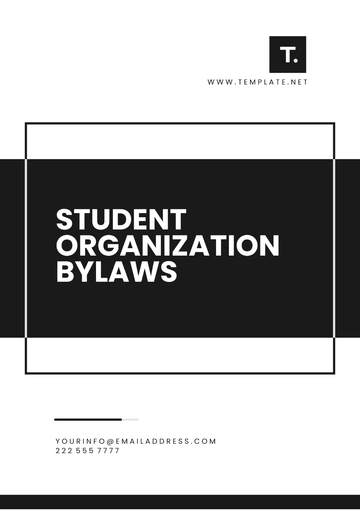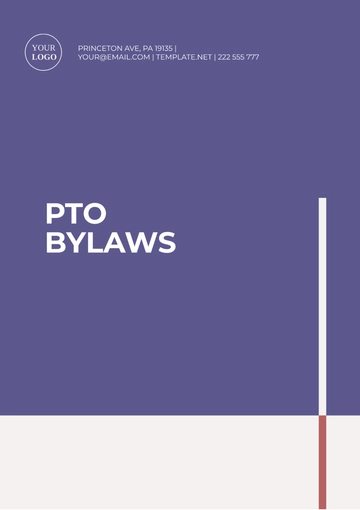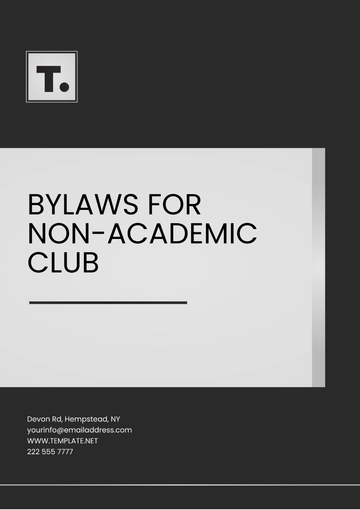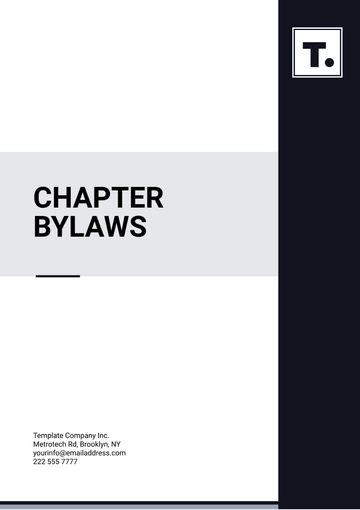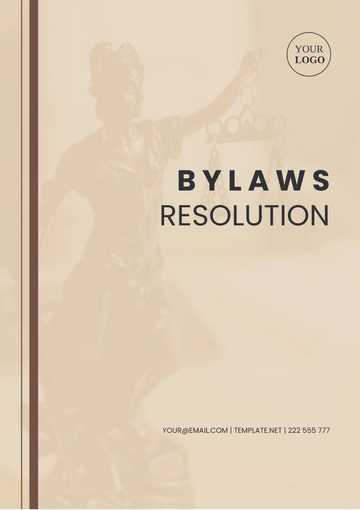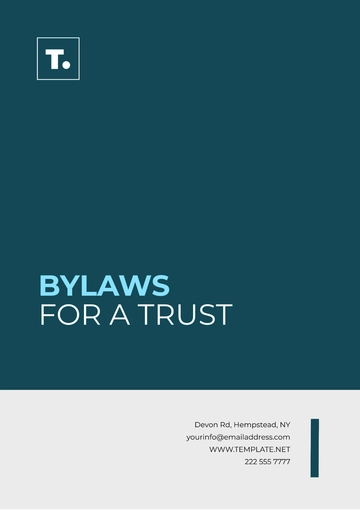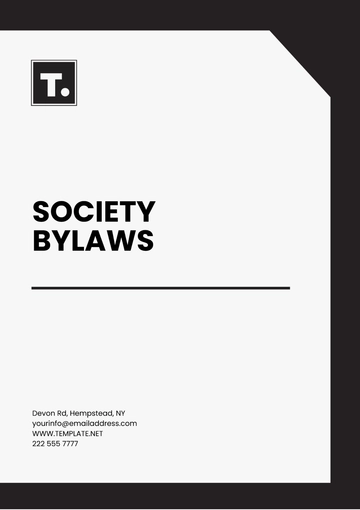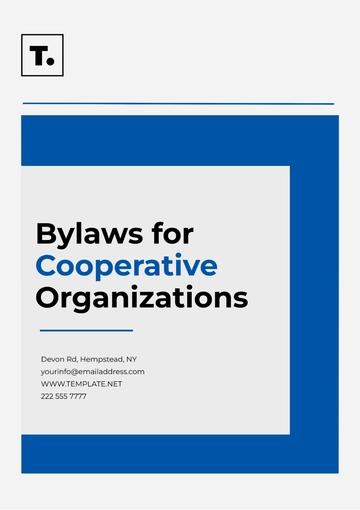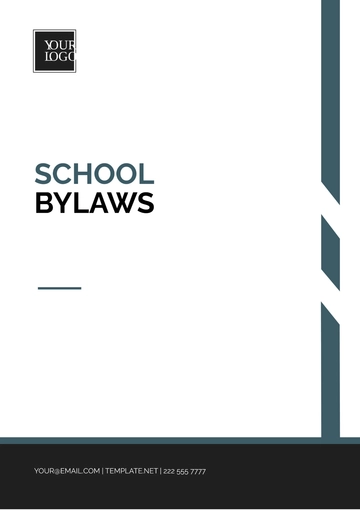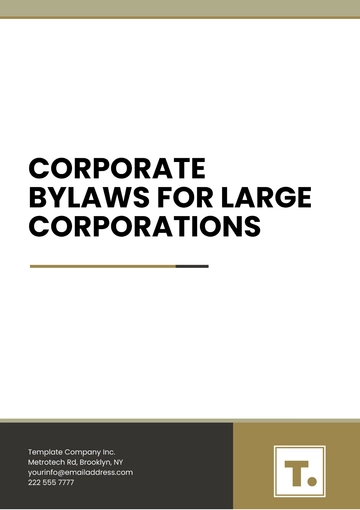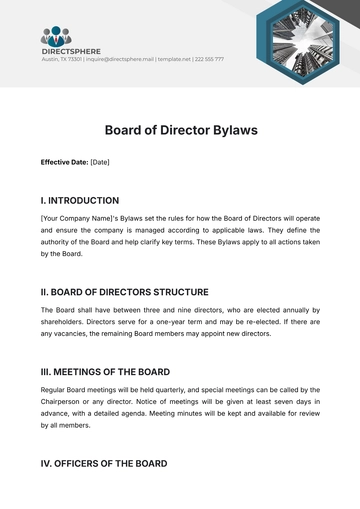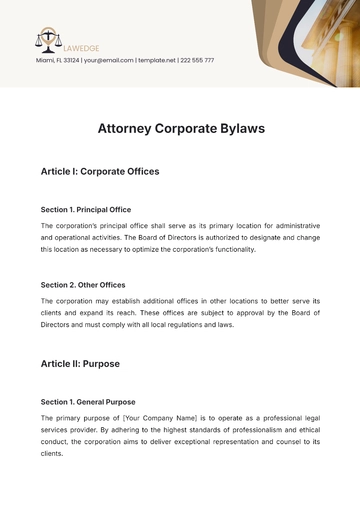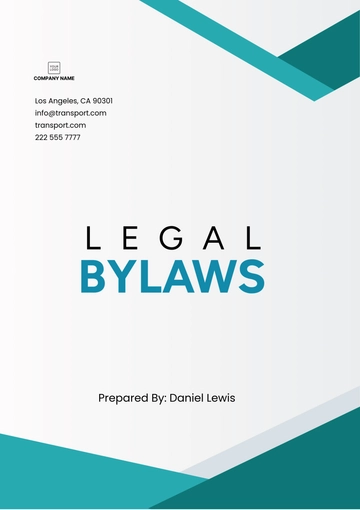Free Society Bylaws
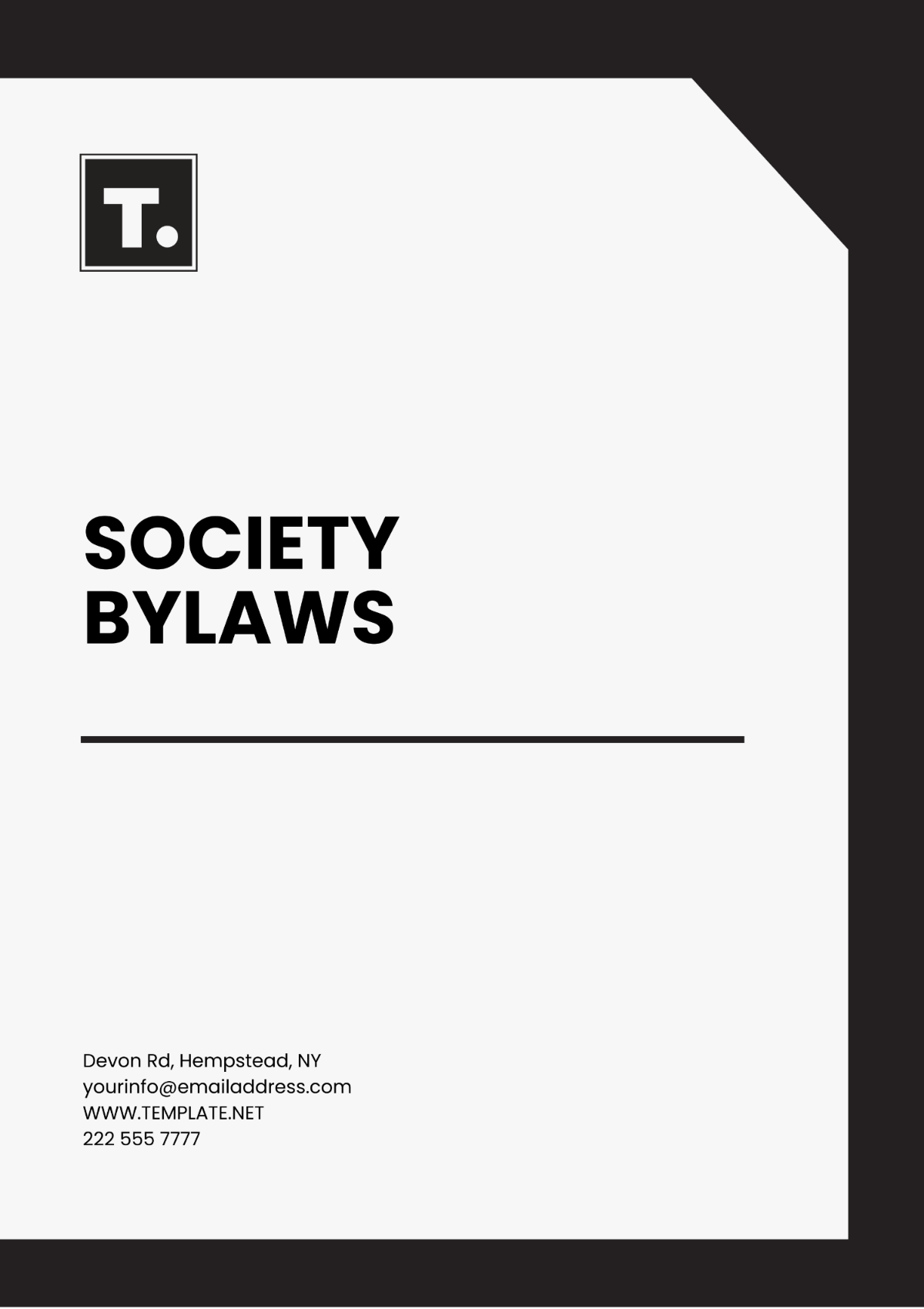
Prepared by: [YOUR NAME]
Welcome to the Society Bylaws, a comprehensive framework designed to establish the structure, roles, responsibilities, and operational procedures of our organization. These bylaws are crafted to facilitate efficient decision-making, ensure accountability, and guide us in fulfilling our mission with clarity and purpose. By adhering to these principles, we strive to create a community where every member can thrive and contribute towards our collective goals.
Article 1: Name and Purpose
1.1 Name: The society shall be known as [NAME OF SOCIETY].
1.2 Purpose: Our society aims to cultivate civic involvement and empowerment via education, advocacy, and cooperation, with goals including the advancement of social justice, fighting for equality and inclusiveness, and offering assistance and resources for those in need and underserved communities. Through united efforts and reciprocal respect, we intend to establish a fair and empathetic society where all have chances to flourish and positively impact their communities.
Article 2: Membership
2.1 Eligibility: Membership is open to individuals who are open to individuals who align with the society's mission, irrespective of demographic factors. Applicants must be committed to active participation and adherence to the society's principles. A simple application process may be required, such as completing a form or attending an orientation session.
2.2 Admission: Individuals seeking membership must Prospective members can apply for membership by submitting a completed membership application form along with any required documentation to the Membership Committee. Upon receipt, the Membership Committee will review the application and make a recommendation for approval to the Board of Directors.
2.3 Rights of Members: Members shall have the right to:
a. Participation in decision-making processes.
b. Access to organizational resources and facilities.
c. Opportunities for leadership and professional development.
d. Voting rights in elections and on important matters affecting the organization.
2.4 Responsibilities of Members: Members shall have the responsibility to
a. Actively participate in society events, meetings, and activities to contribute to the collective mission and objectives.
b. Adhere to the society's code of conduct and ethical standards in all interactions and engagements.
c. Support fellow members and foster a spirit of collaboration, respect, and inclusivity within the society.
d. Take initiative in promoting the society's goals and values within their respective communities and networks.
2.5 Termination of Membership: Membership may be terminated due to:
2.5.1 Grounds for termination of membership:
a. Violation of the society's code of conduct or ethical standards.
b. Non-payment of membership dues or fees within the specified timeframe.
c. Engaging in activities that are detrimental to the reputation or objectives of the society.
d. Failure to fulfill the responsibilities and obligations outlined in the society's bylaws.
e. Any other behavior deemed inconsistent with the values and mission of the society.
2.5.2 Procedure for termination of membership:
a. The member in question shall be provided with written notice of the allegations against them.
b. The member shall be allowed to respond to the allegations and present any evidence or defense.
c. A designated committee or governing body shall review the evidence and make a termination decision.
d. If termination is deemed appropriate, the member shall be notified in writing of the decision and the effective date of termination.
e. The terminated member shall have the right to appeal the decision according to the established appeals process, if applicable.
Article 3: Governance Structure
Board of Directors: The society shall be governed by a Board of Directors composed of [NUMBER] members elected by the members of the society.
Duties and Powers: The Board of Directors shall be responsible for:
2.1 Setting the strategic direction and goals of the organization in alignment with its mission and objectives.
2.2 Overseeing the financial management and ensuring the fiscal health of the organization.
2.3 Appointing, evaluating, and if necessary, replacing the executive leadership of the organization.
2.4 Reviewing and approving major policies, programs, and initiatives to ensure they align with the organization's values and legal requirements.
Term of Office: Directors shall serve a term of [Years], with the option for reelection.
Meetings: The Board of Directors shall meet [Frequency of meetings], with notice provided [Timeframe] in advance.
Article 4: Officers
Designation: The officers of the society shall include a President, Vice President, Secretary, and Treasurer.
Election and Term: Officers shall be elected by the Board of Directors and shall serve a term of [Years], with the option for reelection.
Duties: The duties of officers shall include:
3.1 President: The President shall preside over meetings of the Board of Directors, provide leadership and direction to the organization, and represent the society in external affairs.
3.2 Vice President: The Vice President shall assist the President in fulfilling their duties, assume the role of President in their absence, and oversee specific projects or initiatives as assigned.
3.3 Secretary: The Secretary shall maintain accurate records of meetings and correspondence, handle official communication on behalf of the organization, and ensure compliance with record-keeping requirements.
3.4 Treasurer: The Treasurer shall manage the financial affairs of the society, oversee budgeting and financial reporting, and ensure the proper handling of funds under established policies and procedures.
Vacancies: In the event of a vacancy in any office, the Board of Directors will convene to nominate and elect a replacement according to the established procedures. This ensures continuity of leadership and smooth functioning of the society's operations.
Article 5: Committees
Establishment: The Board of Directors may establish committees as necessary to carry out the work of the society.
Composition: Committees shall be composed of [NUMBER] members appointed by the President.
Powers and Duties: Committees shall have the powers and duties as delegated by the Board of Directors.
Article 6: Meetings
Regular Meetings: Regular meetings of the society shall be held [FREQUENCY OF MEETINGS].
Special Meetings: Special meetings may be called by [AUTHORITY EMPOWERED TO CALL SPECIAL MEETINGS] upon [NOTICE REQUIRED FOR SPECIAL MEETINGS].
Quorum: A quorum for meetings shall consist of [PERCENTAGE/NUMBER] of the members eligible to vote.
Voting: Unless otherwise specified, decisions shall be made by a voting method, with each member entitled to vote(s).
Article 7: Finances
Fiscal Year: The fiscal year of the society shall be from [EFFECTIVE DATE].
Budget: The Board of Directors shall approve an annual budget outlining anticipated revenues and expenses.
Financial Records: Accurate financial records shall be maintained and made available for inspection upon request.
Audits: An independent audit of the society's financial records shall be conducted [FREQUENCY OF AUDITS].
Article 8: Amendments
1. Proposals: Proposals for amendments to these bylaws may be initiated by any member in good standing, providing an avenue for democratic input and evolution of our governing principles. This inclusive approach ensures that the voices and perspectives of all members are heard and considered in shaping the future direction of our society.
2. Approval: Amendments shall be approved by [PERCENTAGE/NUMBER] of the members eligible to vote.
3. Notice: Notice of proposed amendments shall be provided to the members [TIMEFRAME] before the vote.
Article 9: Dissolution
1. Procedure: In the event of dissolution, the procedure outlined in the bylaws shall be followed, ensuring a fair and orderly process. This procedure typically involves the appointment of a dissolution committee, the settlement of debts and liabilities, and the distribution of remaining assets as per legal requirements. Through adherence to this procedure, society can conclude its activities responsibly and under established protocols.
2. Disposition of Assets: Upon dissolution, any remaining assets shall be distributed to:
2.1 Upon dissolution, any remaining assets shall be distributed to registered charitable organizations approved by the Board of Directors.
2.2 The beneficiaries of asset distribution shall be determined by a majority vote of the remaining members present at the final meeting before dissolution.
2.3 Assets may be distributed in proportion to the contributions or membership dues paid by individual members, as recorded in the society's financial records.
2.4 The Board of Directors shall oversee the fair and equitable distribution of assets under the legal obligations and requirements governing the dissolution process.
Article 10: Conflict of Interest
Disclosure: Directors, officers, and committee members shall disclose any potential conflicts of interest.
Recusal: Individuals with a conflict of interest shall recuse themselves from deliberations and voting on related matters.
These bylaws stand as the cornerstone of our society, embodying our commitment to transparency, fairness, and excellence in all our endeavors. With these guiding principles in place, we move forward united in our purpose, and confident in our ability to navigate challenges and seize opportunities together. Together, let us uphold these bylaws as the foundation of our shared vision, forging a path toward a brighter and more prosperous future.
- 100% Customizable, free editor
- Access 1 Million+ Templates, photo’s & graphics
- Download or share as a template
- Click and replace photos, graphics, text, backgrounds
- Resize, crop, AI write & more
- Access advanced editor
We are introducing the Society Bylaws Template from Template.net! Crafted for clarity and convenience, this editable and customizable template empowers you to define your organization's guidelines effortlessly. Seamlessly edit in our Ai Editor Tool to tailor it to your needs. Streamline your governance process today with our comprehensive solution. Unlock cohesion today.




